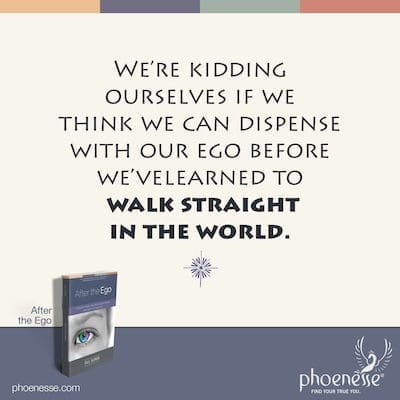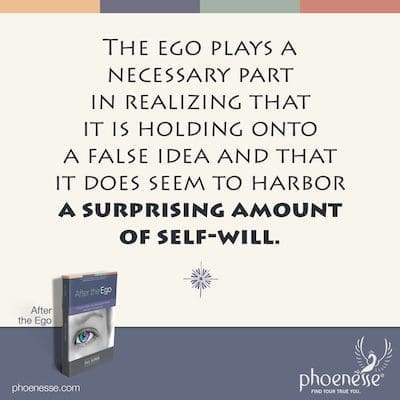What is the endgame of being human? Where are we all heading? What's the point of life? Our goal is always one thing: to become our Real Self. All the many teachings from the Pathwork Guide are approaching this same task, each coming at it from a different angle. As we work in this direction, it will help if we understand how our inner self, or Real Self, differs from our outer self, or ego. What is the relationship between these two? For many of us, having heard various conflicting theories, we're in confusion about the function of the ego.
Some postulate the ego is essentially negative and therefore undesirable. So then the goal of spirituality is to get rid of it, right? Other theories—particularly from a psychological point of view—say our ego is important, for we cannot be mentally healthy without an ego.
Which of these viewpoints is correct? Let's find out. For if our vision on this is not clear, it will be difficult to reach our all-important goal of self-realization.

We're kidding ourselves if we think we can dispense with our ego before we've learned to walk straight in the world.
First, let's clarify the Real Self and its essence. This is our inner self and it is an integral aspect of nature. As such, we are bound to the laws of nature. And nature is something we can trust. It's not reasonable then, to not trust ourselves—to not trust our innermost selves. If it seems to us that nature is our enemy, this is only because we don't understand the natural laws that nature is following.
So our inner self is nature. Our Real Self is life. We are creation. This is a better way to say it than to say we are "a part" of nature, or part of creation. Our Real Self and nature are one and the same thing.
Whenever we function from our Real Self, we are in truth and we are joyful. Our most constructive and creative contributions to life arise from our inner self. So everything that expands life—everything wise and beautiful and generous—comes from here. This is worth contemplating, as it cannot be emphasized too much. It's essential we understand this truth, not only with our mind—we need to feel this.
If this is so, then what is the function of our outer personality—our ego? This is the part of us that operates on a level we have direct access to. Since we are directly, or consciously, aware of our ego, this is our conscious awareness. This is the part of us that thinks, acts, sorts and makes decisions.
If we have a weak ego, we'll have a hard time coping with life. If we have an overgrown ego, we'll be lost from our Real Self. In other words, both extremes of ego-weakness and ego-inflation will result in separation from our inner essence. And this essentially is our problem. All our conflicts in life stem from having too big an ego, or too small an ego.
Most often, it's not that one person has a big ego and another has too small an ego. Rather, it's that both have an imbalance within themselves. We're underdeveloped in one area of our personality and overdeveloped in another. So nature will take its course and try to reestablish a balance. Overdevelopment of our ego, then, may be nature's way of straightening out the disturbance caused by having a weak ego in another area of our lives.
It's only after we've sufficiently developed our ego that we can be done with them. Maybe this sounds like a contradiction, but it's not. Because if our ego is not well-developed, all our efforts to compensate for this will wind up leading to more weakness. So we're kidding ourselves if we think we can dispense with our ego before we've learned to walk straight in the world. For as long as we lack a strong enough ego, we lack the ability to think, sort, decide and act appropriately in any situation that comes up.
If we hope to reach the holy grail of our Real Self by rejecting the effort needed to develop a healthy ego, we're coming at things from a place of poverty. The correct way forward is to fully own and operate our outer selves first. If we hope to skip the creation of a healthy ego—perhaps because we're too lazy—we're in error. And this is going to cost us, as all errors do. Make no mistake, developing a healthy ego is no easy thing. But we simply can't avoid this work. Doing so only delays reaching our goal.
To restate the situation: Only when we are in full possession of our outer ego-self can we let go of it and reach our inner self. This is not a theory; this is a spiritual law. And it's actually a logical law that pushes us to act from a place of strength and abundance, rather than from a place of neediness and poverty. Then, once we reach this mini-mountaintop—when we are in full possession of our outer ego—we'll have the much-needed perspective that, hey, this is not the final answer. This is not the end-all and be-all of who we are. Now, with the use of an ego that's neither underdeveloped nor overemphasized, we can start to transcend ourselves and reach a higher state of consciousness. But not before then.
So as we make our way along our spiritual path, we'll begin—perhaps through meditating—by applying the faculties of our ego. In practical terms, we'll use our ego mind to absorb what's going on in our life and sort out the truth of the situation. Only later will we be able to grasp things on a deeper level of our being, in our greater consciousness.
Many people don't even realize there is anything beyond their ego. They think the goal of life is to cultivate a strong ego—although they may not think about things in these terms. And that's how an overdeveloped ego comes into play. But this is a dead-end street. It misses the whole point. Instead of reaching the stage of having a powerful ego that can be transcended, the person further aggrandizes it. But the scope of the ego is so limited and the possibilities so puny, there's nothing great happening here at all.
It's super important to understand the spiritual law at work here. It's the law stating we must fully reach a certain state of being before we can abandon it for something better. Too often, we totally ignore this law. Our Real Self knows that the universe is unlimited, and that absolute perfection exists. In our Real Self, we know that we can ultimately expand and reach the sky. And when we get there—when we're fully living from our real inner selves—we will become the master of all natural laws.
We all deeply yearn to live in this final reality, and to reach our full potential. But if we hear the call of this message from our deepest inner selves without the benefit of a healthy ego, we may distort the meaning. Then we will childishly strive for perfection.
Think of a baby at birth who has no ego. It only wants one thing: total pleasure. Babies seek omnipotence, without frustration or lack of fulfillment. To go on with such strivings though, without the development of an ego, is to be unrealistic and even destructive. And so it is that on a spiritual path, we learn that we must let go of our forceful demands before we can come to our desires, fresh and new, and actually realize them.
The long and short of it is this. We must accept our limitations as human beings before we can tap into the unlimited fount of power sitting in our core, waiting for us to find it. We must accept our imperfections, as well as the imperfections of life on Earth, before we can reach our destiny, which is to live with absolute perfection.
And the thing stopping most of us from getting there is this: We must shed the childish notion that we can have all this and not work for it—that we can get there without the aid of a well-developed ego. We have to let go of our outdated desire for pleasure supreme and figure out how to make do with limited pleasure, before we can discover all that can be ours. To accept less is to accept life as it is right now, in this earthly reality. And to do this, we're going to need to have an ego.
Once our ego is well-equipped for dealing adequately with what this earthly realm offers—which is where our body and soul now lives—then we can deeply comprehend our greater faculties. But we must walk before we can run. So yes, our ultimate goal is perfection, unlimited power and full pleasure. And these aren't things to only hope for in a faraway future, after we've left our body. The measure is not time, but quality. And these qualities can exist at any time. In particular, they will exist the moment we awaken to truth—the moment we wake up. Yet we can awaken to truth only when we've found and let go of our childish demands for utter perfection, utter power and utter pleasure.
When we still have a weak ego, these are selfish desires that are also destructive. So our work—if we want to attain our desires—must be to abandon them. This is the same basic spiritual law that says: If we work from abundance, we'll create more abundance; if we work from poverty and need, we'll create more poverty and need.
When we have a strong, healthy ego, we can relax into our current reality without being upset that we may not get to experience fulfillment right now. We realize that there must be obstructions within ourselves that must give way before bounty can come. But when we have a weak ego, we can't wait. We think we'll just die if our wish to rule the world doesn't happen. Our wish, then, is a negative one. We'll cling to the limited laws and conditions of the little ego, and doing so will distort the greater laws.
From our weakness and our neediness, our undeveloped ego will avoid the work necessary to create strength and fullness. Instead of adequately dealing with what's in front of us, we'll try to bypass it. But once we get a taste of our Real Self, we'll no longer fear it. Then we'll stop over-emphasizing our ego. We will no longer neglect the important work of developing our ego faculties, which too often are slumbering, left untended.
Best of all, we'll trust life, because we'll begin to trust ourselves. Trust, after all, is an essential key for living a good life.

The ego plays a necessary part in realizing that it is holding onto a false idea and that it does seem to harbor a surprising amount of self-will.
The ego's job description
False ideas and ego-directed self-will are a natural part of the ego world. They are not, however, natural aspects of our Real Self. Fortunately, all egos come equipped with the innate ability to give up both false ideas and self-will. In fact, only the ego has the power to do so. The ego is also given the important task of changing its own mind and its intention.
It plays a necessary part in realizing that it is holding onto a false idea and that it does seem to harbor a surprising amount of self-will. Then it's up to the ego to decide whether to continue down the road it's on, or try a new path and abandon these two burdens.
The ego alone enjoys the job of exchanging a false idea for a truthful one. Doing so typically involves letting go of tense, anxious self-will and swapping it out for a flexible, free-flowing will that is relaxed. This critical work will, of course, require the use of the ego's well-developed reasoning powers, along with a willingness to call upon the intuitive levels of the self for higher inner guidance.
"All the blessings are extended to every one of you. These blessings are a reality that transcend and envelop you. They are the universal love, responding to your valiant efforts of self-expansion. Be in peace, be in God!"
–The Pathwork Guide

Next Chapter
Return to After the Ego Contents
Read Original Pathwork Lecture #132: The Function of the Ego in Relationship to the Real Self

